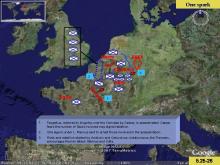Erat in Carnūtibus summō locō nātūs Tasgētius, cūius māiōrēs in suā cīvitāte rēgnum obtinuerant. Huic Caesar prō eius virtūte atque in sē benevolentiā, quod in omnibus bellīs singulārī eius operā fuerat ūsus, māiōrum locum restituerat. Tertium iam hunc annum rēgnantem inimīcī palam multīs ex cīvitāte auctōribus interfēcērunt. Dēfertur ea rēs ad Caesarem. Ille veritus, quod ad plūrēs pertinēbat, nē cīvitās eōrum impulsū dēficeret, L. Plancum cum legiōne ex Belgiō celeriter in Carnūtēs proficīscī iubet ibīque hiemāre, quōrumque operā cōgnōverat Tasgētium interfectum, hōs comprehēnsōs ad sē mittere. Interim ab omnibus lēgātīs quaestōribusque, quibus legiōnēs trādiderat certior factus est in hīberna perventum locumque hībernīs esse mūnītum.




